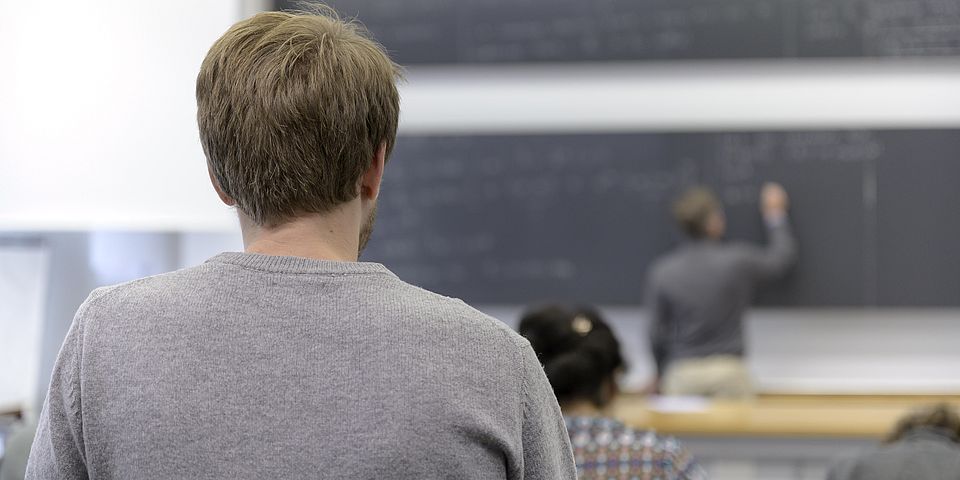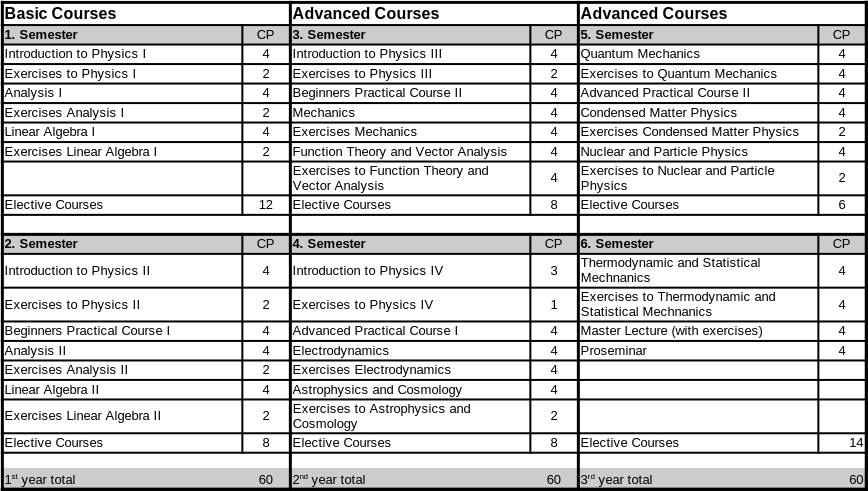
Study Structure Bachelor
The Basel Bachelor Program in Physics consists of two semesters (one year) of introductory physics courses, mathematics lectures and the introductory laboratory course (total of 60 credit points (CP)) followed by four semesters (two years) of courses on experimental and theoretical physics, advanced laboratory courses, a proseminar plus a number of elective courses (total of 120 CP).
The minimum time required to obtain a Bachelor's degree in Physics is three years. To complete all the requirements in three years, students usually feel that a full time commitment to working on courses and exercises is necessary, including a significant amount of time spent preparing for the comprehensive examinations. Admission as a part time student is possible but will of course prolong the time to obtain the Bachelor degree.
Overview

Study Structure
| Modules | Courses | CP | Time of Exams |
|---|---|---|---|
| Experimental Physics I | Physics I & II | 12 | End of 1st and 2nd semester |
| Experimental Physics II | Physics III & IV | 12 | End of 3rd and 4th semester |
| Mathematics | Analysis I & II / Linear Algebra I & II | 24 | End of 1st and 2nd semester |
| Practical Courses I | Beginner's Practical Courses I & II | 8 | |
| Practical Courses II | Advanced Practical Courses I & II | 8 | |
| Theoretical Physics I | Mechanics / Electrodynamics | 14 | End of 3rd and 4th semester |
| Theoretical Physics II | Quantum Mechanics / Statistical Mechanics | 16 | End of 5th and 6th semester |
| Mathematical Methods | Mathematical Methods | 6 | |
| Structure of Matter I | Astrophysics & Cosmology | 6 | |
| Structure of Matter II | Condensed Matter / Nuclear & Particle Physics / Special Lecture | 16 | End of 5th and 6th semester |
| Proseminar | 4 |
Video Stefan Mesmer about Experimental Physics Lecture
The elective block consists of 56 credit points, of which at least 30CP must be acquired in courses in physics, mathematics and computer science. In addition, at least 12CP must be acquired in an interdisciplinary manner, i.e. in courses outside of physics, mathematics and computer science.
Examples of elective courses in physics, mathematics and computer science:
- Special lectures in physics
- Additional practical courses and block courses
- Advanced mathematics lectures
- Computer science courses such as Fundamentals of Programming
- Supplementary proseminars
Examples of interdisciplinary courses are:
- Courses from other departments of the Faculty of Science (except physics, mathematics and computer science), e.g. from chemistry, biology, earth sciences
- Courses from departments of the Faculty of Humanities and Social Sciences, e.g. from Philosophy, Languages, History, Media Sciences
- Courses from the Faculty of Business and Economics, the Faculty of Law, the Faculty of Medicine, etc.
Further information on the courses offered can be found in the online course directory (link: https://vorlesungsverzeichnis.unibas.ch/en/home).
Many physics students start their bachelor's degree after they have received their Swiss Matura after completing high school (click here to find out how you can apply). However, there are other ways of admission to our Bachelor's degree. For detailed information, please visit the website of the study secretariat of the University of Basel. A registration fee of CHF 100 will be charged. If the application is submitted late, an additional fee of CHF 150 will be charged.
The language of instruction for the Bachelor's degree programs is generally German. Mastering the German language is of the utmost importance for a successful completion of the Bachelor's degree. We usually speak English in our research groups and participation in research projects does not require knowledge of the German language.
At the moment, foreign Bachelor students who are in Switzerland on a student visa must be enrolled and generally are not allowed to work, or only for a very limited time. In addition, the university guidelines do not allow Bachelor students to be employed in the departments. Therefore, Bachelor students must bring the financial means to bear their living expenses during their studies up to the Bachelor's degree. In some cases, part-time employment, for example as a student assistant, may be possible. However, funds earned in this way are not yet sufficient to cover the cost of living.
The tuition fee at the University of Basel is currently CHF 850 per semester. Click here for details.
Further information for international students can be found here.
For particularly talented and motivated students, the Department of Physics offers an “Honors Track” for Bachelor students. More information is available here.
Physics bachelor and master students with an outstanding average of grades and proven personal engagement can apply for travel stipend of the Department of Physics, e.g. for the participation in an international conference abroad.
In general eligible for the travel stipend are...
- ...Physics bachelor or master students matriculated at the University of Basel,
- ...who show an outstanding performance and
- ...who are able to demonstrate the additional benefit of their travel for their studies.
Applications for a travel stipend are being accepted on a continuing basis. The applications have to be admitted at the latest 6 weeks before the departure date of the intended travel.
In case you want to apply for a travel stipend, please submit, timely and complete, the following documentation:
- CV
- Copy of your track record
- Information about the purpose/aim of the travel
- Motivational letter (max. 500 words) in German or English
- Travel budgetr
Please send all applications and questions reg. the travel stipends via email to the Physics Studies Committee.
There are no legal claims and no right of recourse against the decision of the Physics Studies Committee reg. the travel stipends.
In case a travel stipend is awarded, the scholar is obliged to submit a final travel expense form with all the relevant receipts to the UK, at the latest 6 weeks after the return of the funded travel.
Studies committee
Physics can be studied as a minor subject (German: "Studienfach" or "ausserfakultäres Studienfach"), also in combination with higher studies for emerging teachers. For this, 76 credit points must be acquired. Suitable organization of the time table, i.e. combining the different lectures in Physics with the course program of other departments, is left to the students.
For further information check the following documents (all available in German):
Important
The information provided on this website is not legally binding and may no longer be up to date. For details, please contact the Physics Studies Committee.
Head of the Studies Committee
Studies Coordinator
Important
The information on this website is not legally binding and may not reflect the most recent changes in the study regulations (Studienordnung). To obtain more information and in case of questions, please contact us.
